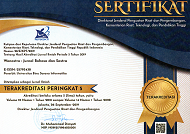The Correlation Between Students’ Behavioral Engagement And Students’ Speaking Skill
Abstract
The objective of the research is to find out whether there is any correlation between students’ behavioral engagement and students’ speaking skill. The research used quantitative approach and the method was correlational research. The population was the eighth-grade students of SMP Islam Malahayati Jakarta. The sample of 26 students were randomly selected. The data of the students’ behavioral engagement were collected by using the questionnaire which was adopted from Miserandino’s BEQ, while the data of students’ speaking skill were collected by using the speaking test which had been validated by the expert judgment. The result shows that there is a positive significant correlation between students’ behavioral engagement and their speaking skill. It can be proven from the result of rxy = 0.698 is higher than rtable = 0.388 and tcount = 4.770 is higher than ttable = 1.7109. Coefficient determination shows that (0.698)2×100% = 48.72% so that students’ behavioral engagement contributes 48.72% towards their speaking skill. It can be concluded that there is a positive significant correlation between students’ behavioral engagement and students’ speaking skill. It means that the students who engage behaviorally have good speaking skill and vice versa.
Full Text:
PDFReferences
Alwasilah, A. C. (2000). Perspektif Pendidikan Bahasa Inggris di Indonesia dalam Konteks Persaingan Global. Bandung: CV Andira.
Arikunto, S. (2014). Prosedur Penelitian Suatu Pendekatan Praktek. Jakarta: Rineka Cipta.
Brown, D. (2004). Language Assessment: Principles and Classroom Practices. New York: Pearson Education, Inc.
BSNP. (2006). Standar Isi untuk Satuan Pendidikan Dasar dan Menengah. BSNP: Jakarta.
Budiyono. (2015). Statistika untuk Penelitian. Surakarta: UNS Press.
Fredericks, J.A, Blumenfeld, P.C & Paris, A. H. (2004). School Engagement: Potential of The Concept, State of the Evidence. Review of Educational Research, Vol.74 (1), 62. https://doi.org/10.3102/00346543074001059
Gunuc, S. (2014). The Relationship between Student Engagement and Their Academic Achievement. International Journal on New Trends in Education and Their Implications, Vol. 5 (4), 199–214. http://www.ijonte.org/FileUpload/ks63207/File/19.gunuc.pdf
Harmer, J. (2007). The Practice of English Language Teaching (Fourth Edi). London: Longman.
McDonough, J. et al. (2013). Materials and Methods in ELT: A Teacher’s Guide. Oxford: Wiley-Blackwell.
Sugiyono. (2012). Statistika untuk Penelitian. Bandung: Alfabeta.
Trowler, V. (2010). Student Engagement Literature Review. Departement of Educational Research Lancaster University.
Veiga, F. . et. a. (2014). Assessing Students’ Engagement: A Review of Instruments with Psychometric Qualities. International Perspectives of Psychology and Education. Lisboa: Instituto de Educação Da Universidade de Lisboa. https://core.ac.uk/download/pdf/32332897.pdf
DOI: https://doi.org/10.31294/wanastra.v14i1.11456
Copyright (c) 2022 Delis Meta Tiana, Retno Rahayuningsih

This work is licensed under a Creative Commons Attribution-ShareAlike 4.0 International License.
Index by:
Published by Department of Research and Community Service (LPPM) Universitas Bina Sarana Informatika by supported Relawan Jurnal Indonesia
Jl. Kramat Raya No.98, Kwitang, Kec. Senen, Jakarta Pusat, DKI Jakarta 10450

This work is licensed under a Creative Commons Attribution-ShareAlike 4.0 International License






